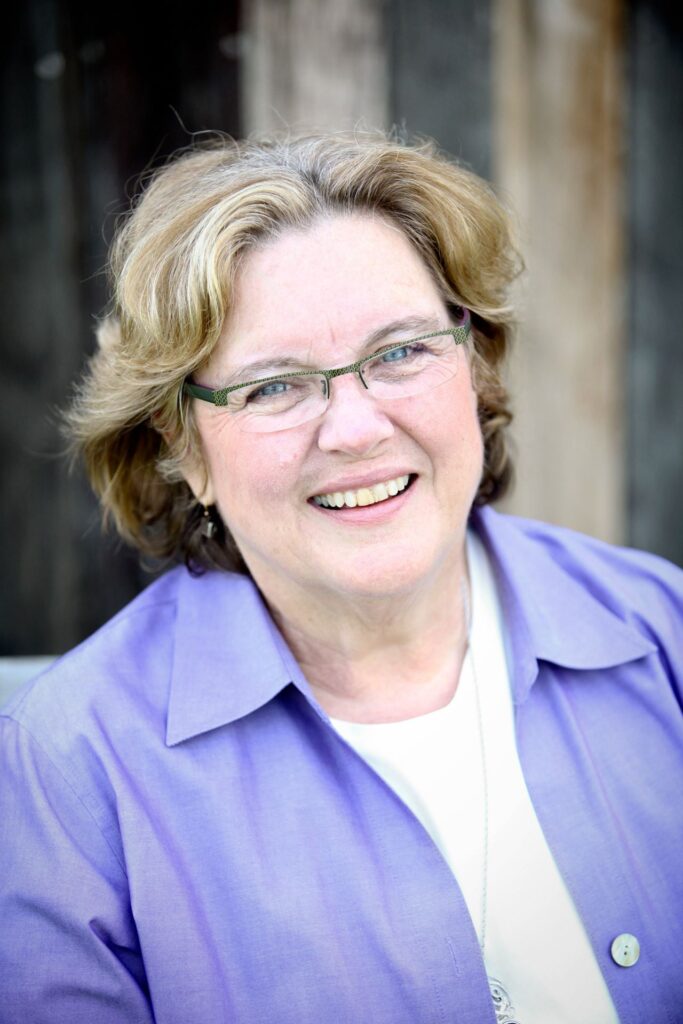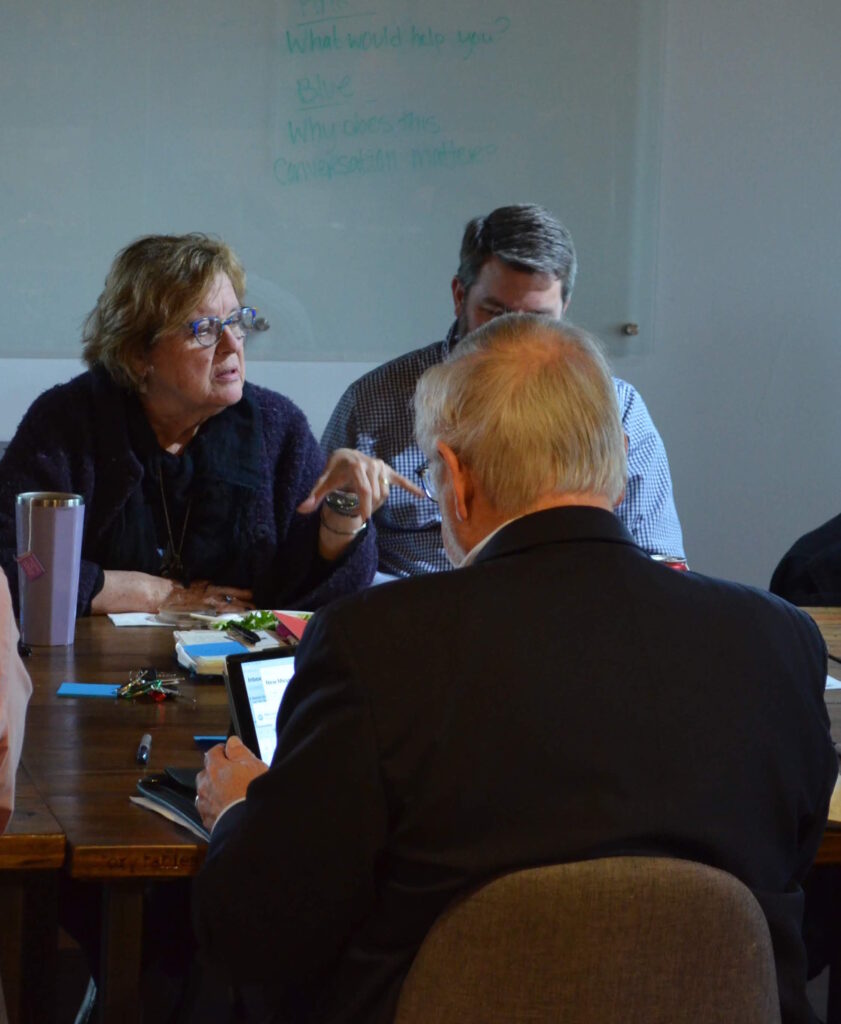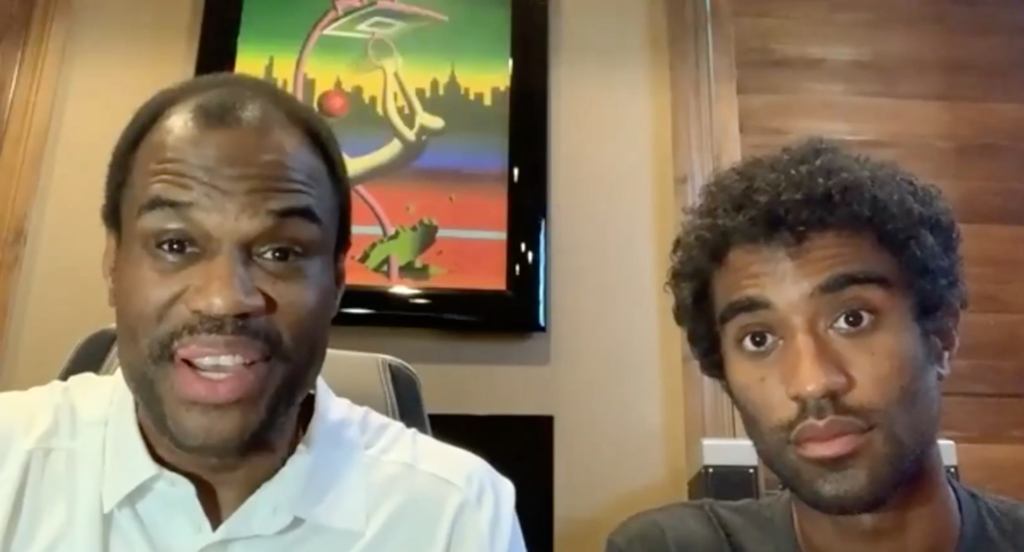Faith+Finance: Meet the Minister on a Mission about Money
By the Rev. Kyle Oliver
I attend a lot of church-related webinars. So far, only one has included a ten-time NBA All Star on the speaker slate.
But if you’ll excuse the mixed-sport cliché, it still felt par for the course that my June 12 lunchtime enrichment featured former San Antonio Spurs center David Robinson. That’s mostly because this event was organized by the Rev. Rosa Lee Harden ’99, a prolific networker and convener of leaders around big ideas.
Harden connected with the U.S. Naval Academy grad and 1995 NBA MVP through mutual colleagues in impact investing, a social-good-oriented movement in which she and her husband, Kevin Jones, have played a unique role.
Harden’s relationship with Robinson and his son, David Robinson Jr., is especially important to her most recent venture, Faith+Finance. Before the pandemic, the event series and mixed-discipline community of practice were supposed to have launched at a now-postponed conference last May in Robinson’s adopted hometown.
“The Admiral,” as Robinson is known, co-founded a Christian school in San Antonio in 2001. His son works in impact investing both with Admiral Capital Group as well as Blueprint Local, a community-oriented firm that is active in the South Texas metropolis.
“I was motivated to get into the education space because of the disparities,” Robinson told webinar moderator David Bailey. “In the case of San Antonio, [leaders] said,‘Let’s build a highway to separate north and south, east and west, and let’s make sure commerce doesn’t go across that highway.” He went on to point out that the college attendance rate on either side of the city’s economic divide differs by 67 percentage points.
The emphasis on the connection between economic investment and social justice (in this case, educational opportunity) was typical of a Harden- produced event. And like the presence of star athletes, this emphasis was somewhat atypical for a theologically oriented continuing education offering.
Harden hopes Faith+Finance can help change this latter status quo—and many others.
“The Church has a history of making businesses change because of its moral voice. I want to awaken that voice in the 21st century, so people will start asking questions about horrific business practices and start seeing that it’s their own responsibility as Christians to shop differently, to think differently, to behave differently,” Harden said.
“We’ve lost that voice and we’ve got to get it back.”
Full disclosure: The other reason this star-studded webinar felt familiar to me was that it was a remix of potential programming we had discussed during the short time Harden was my client.
Last winter, just before I came to work for her alma mater, I served as co-producer and communications lead for Harden’s new venture.
“Rosa Lee’s work stands on its own,” said the Very Rev. W. Mark Richardson, president and dean, when I noted the potential conflict of interest in my pitch for this story. “We ought to highlight her creativity for the CDSP community.”
This profile is based on an interview I conducted with Harden in June and another I produced last December when she was just beginning to spread the word about Faith+Finance.
An unconventional seminary side-job
Harden came to CDSP as a student in the midst of years of serial entrepreneurship in partnership with Jones, including as publishers of the Mississippi Business Journal.
“After my first year at CDSP, Kevin was doing pretty traditional journalism about the Internet for Interactive Week, and he started noticing this thing about businesses that were sprouting up online,” Harden recounted.
“I was doing Clinical Pastoral Education in Concord. We had a membership at the YMCA because it’s hot over there. He and I were water-walking in an outdoor swimming pool, and he told me about having stumbled on a site, hanes.com, the underwear people. You could buy Hanes and Acme and Baker, all of the different t-shirts. He said, ‘This is just weird. Why is Hanes advertising on their site how you buy competitors’ stuff?’”
Over the next few weeks, they figured it out. Online retailers were taking a lesson from businesses like car dealerships. When a new dealership opens, they don’t set up across town from their competitors. They go right to where all the other dealerships are—where people go to make their car-buying decision.
“We discovered that, oh my gosh, businesses are marketing other people’s stuff to get attention to their own websites,” Harden said.

They weren’t just selling underwear, in other words. They were creating markets. Jones began writing a stand- alone newsletter about this and related online trends.
“As far as we know, we were the first people to use the term B2B [business to business] e-commerce,” Harden said.
By Harden’s third year at CDSP, she and Jones had launched Net Market Makers, adding an event series to Jones’s newsletter work. By the time she started in the MA program a year later, it was a well-established business with a third partner working full-time. That partner was the Rev. Dr. Jay Johnson (GTU ’98), who was just finishing his PhD in philosophical theology. “We were doing international events in London and Boston and all over. We had literally thousands of people attend,” Harden recalled.
“The week I was ordained to the diaconate, we sold Net Market Makers. On Monday, we were signing the paperwork in a suite at the Plaza in New York, where we had just paid $75 for a hamburger. And then on Thursday, I was in Jackson, Mississippi, being ordained.”
In more ways than one, it was time to move on.
Many returns on social capital
Harden would go on to serve as rector of Holy Innocents Episcopal Church in San Francisco for ten years and for some of that time to serve as creative director and executive producer for Every Voice Network.
Harden formed the latter nonprofit to produce and sell Via Media, a “video enhanced curriculum designed to proclaim the Good News of God in Christ Jesus and to present the Episcopal Church in a contemporary context.”
Here again we see the theme in Harden’s work of convening around ideas. The series featured recorded conversations between lay people and clergy about the beliefs and practices of “an Anglican way of being Christian.” These videos were intended to spark further conversations in local settings.
Thirty-two congregations around the U.S. piloted the curriculum, which went on to be used by more than a thousand churches. The experience obviously stuck with Harden, who in the time when I worked for her would frequently begin stories with “When we were shooting Via Media…”

Still, people who know of Harden but don’t know her personally are most likely to identify her as the co-founder and executive producer of another Harden-Jones collaboration: Social Capital Markets (SOCAP).
In 2008, the pair launched the event “at the intersection of money and meaning.” It would go on to grow fivefold in the decade they ran it—and to help define now-commonplace ideas like social entrepreneurship (the launching of businesses aimed at promoting social good) and impact investing (the funding of these ventures both to contribute to that good and to earn a respectable financial return).
Regarding the immense changes during their time with SOCAP, Harden recalled, “When we started, there was a huge financial crisis in the U.S., and 600 people showed up to have this conversation. They didn’t even know what it was going to be about. Ten years into that, we started hearing from our friends who weren’t coming to SOCAP, ‘Oh, yes, we’ve been thinking about putting some of our money into impact investing and we heard about that first from you. Is that what y’all do?’”
Harden says that over the years, as the ideas they helped define went mainstream, the center of gravity within the network shifted away from the ethical why that had been so present in the early years toward the more pragmatic how. Many investors were attracted to this idea of “doing well by doing good” but didn’t necessarily come for the conversations about justice and equity.
“We have a real crisis about who owns what, and who has what, and how does the world work,” she said. What’s more, she was beginning to long for a more theological conversation about these problems.
“I was always frustrated in that very secular event that we couldn’t talk about faith more explicitly,” Harden said. “Because I am a person of faith, a pastor, a priest, I wanted to be able to have those conversations in a way that was a lot more churchy than SOCAP was built to accommodate. In 2019, when I attended a one-time church event that was similar in nature, it finally felt like it was time to really bring together people of faith who are thinking in a new way about money and faith and property and investments and innovation, all of those things.”
From Neighborhood Economics to Faith+Finance
Still, Harden had reason to think that putting “the money people” and “the faith people” in the same room together could work.
In 2014, she, Jones, and Tim Soerens of Parish Collective hosted the first Neighborhood Economics conference at Christ Church Cathedral in Louisville, Kentucky. Their goal was to bring the SOCAP set together with faith and community leaders in a genuinely shared space, rather than simply sponsoring a cohort of faith leaders to attend SOCAP.
“What we found out was that the Church was intrigued this new thing that was happening, this new way of using money,” Harden said. “The SOCAP people were fascinated that churches were doing a lot of social entrepreneurship that they weren’t even aware of. It became this great mashup.”
Hebrew Bible scholar Walter Brueggemann was a significant conversation partner in Neighborhood Economics. Watching the recording of his presentation at the event in Cincinnati, Ohio (bit.ly/brueggemann-ne), I must say that it sounds as if all involved were catching the preacher’s spirit as he shared the groundwork for a scriptural take on economic justice.
Harden emphasized that the church people in the room needed to hear this talk as much as the SOCAP people did:
“I talk to preachers a lot and ask, ‘How often do you preach about money other than during stewardship time?’ They say they never preach about it. They don’t know what to say, and they don’t feel like they, as individuals, manage their own money very well.”
She went on to tell a story that clarifies how faith leaders’ need for formation about money in ministry doesn’t end with financial skills.
“I was at a gathering and a friend of mine made a comment, tongue-in- cheek, that God was having her go through a lot of hard things because God had prepared her to go through hard things,” Harden recounted. “Somebody in the room started laughing and pointing at her saying, ‘That’s bad theology, bad theology.’”
“Then, later in that same day, another person in the room was talking about how churches might invest in for-profit social enterprise that worked in line with the churches’ objectives, which is happening in some places. Somebody asked, ‘How are we going to get our money back if we make this investment?’ The answer was, ‘Well, we’re just going to charge him a whole lot of interest.’ It struck me that nobody in the room made that same joke: ‘bad theology, bad theology.’ That’s because we don’t have a theology of money.”
The five pillars of Faith+Finance
It’s the opportunity to address that theological gap, at least as it exists in most Christian leaders’ training and experience, that most excites Harden. Thus, “economic theologies” sits at the top of the list of five convening themes for the growing Faith+ Finance community.

Two of the others are social entrepreneurship and impact investing, included both to attract past participants in Harden-Jones events and to highlight the innovative work in which many of the Christian, Jewish, Muslim, and Indigenous faith leaders of the couple’s acquaintance have already been engaged.
Rounding out the five themes are the two that, if I’m honest, I relied on most back when my job was convincing ministry colleagues around the Episcopal Church to get involved in Faith+Finance. The themes “assets in transition” and “beyond stewardship” ask in different ways about “how churches can faithfully leverage their buildings, real estate, and other assets amid shrinking congregations and shifting generational giving habits” to find “new models for funding ministry and mission.”
Straddling a few of these themes is my favorite of the many stories I encountered while working for Harden. It hit especially close to home for me.
“A friend of ours, who is a campus minister, had zero students 15 years ago in a church building and wanted to build a dorm, but a dorm that really focused on building community,” Harden said in that interview last December. “He went to his synod and asked them to loan the money at the same interest rate that they were making in the stock market with their endowment, but to loan it to the church to do what the church was called to do, and that was to build student ministry at the university.”
It turns out this campus church and residential community was Pres House in Madison, Wisconsin, a Presbyterian ministry I walked past many times per week when I was a student at the University of Wisconsin. The Episcopal campus ministry that sponsored me for ordination later emulated this location-leveraging strategy—and probably would not exist today without a turn to alternative funding.
That story of renewal alone got me excited to be working on this project, and Harden has dozens of colleagues around the country in the midst of stories like it.
You can’t work for someone on an intense project, even for a short time, without learning a few of their personal mantras, and my favorite of Harden’s is a business precept she learned from her entrepreneur father.
“He wanted to build a community where his business could survive and thrive,” she said.
That’s the other thread that runs through Harden’s story. Net Market Makers, Via Media, SOCAP, and now Faith+Finance all focused on building communities of learners, practitioners, or participants As the communities and their convenings grew and cohered, the businesses became tenable.
This mantra is true in more ways than one for faith communities. A church planter knows that forming, together, the core group of early members has to be a central priority on the path to a church taking root for a season or for the long haul. Moreover, it’s the constant reforming of the community— year after year, through births and deaths and marriages and neighborhood changes and all the rest—that comprises so much of church life for any congregation.
But I think Harden and her colleagues recognize something like her father’s mantra as well in God’s command to the people of Israel in exile: “seek the welfare of the city where I have sent you… for in its welfare you will
find your welfare”(Jeremiah 29:7).
If Faith+Finance can help churches learn to be more meaningful and just economic partners in their communities, my guess is they will find new spiritual partners as well.


